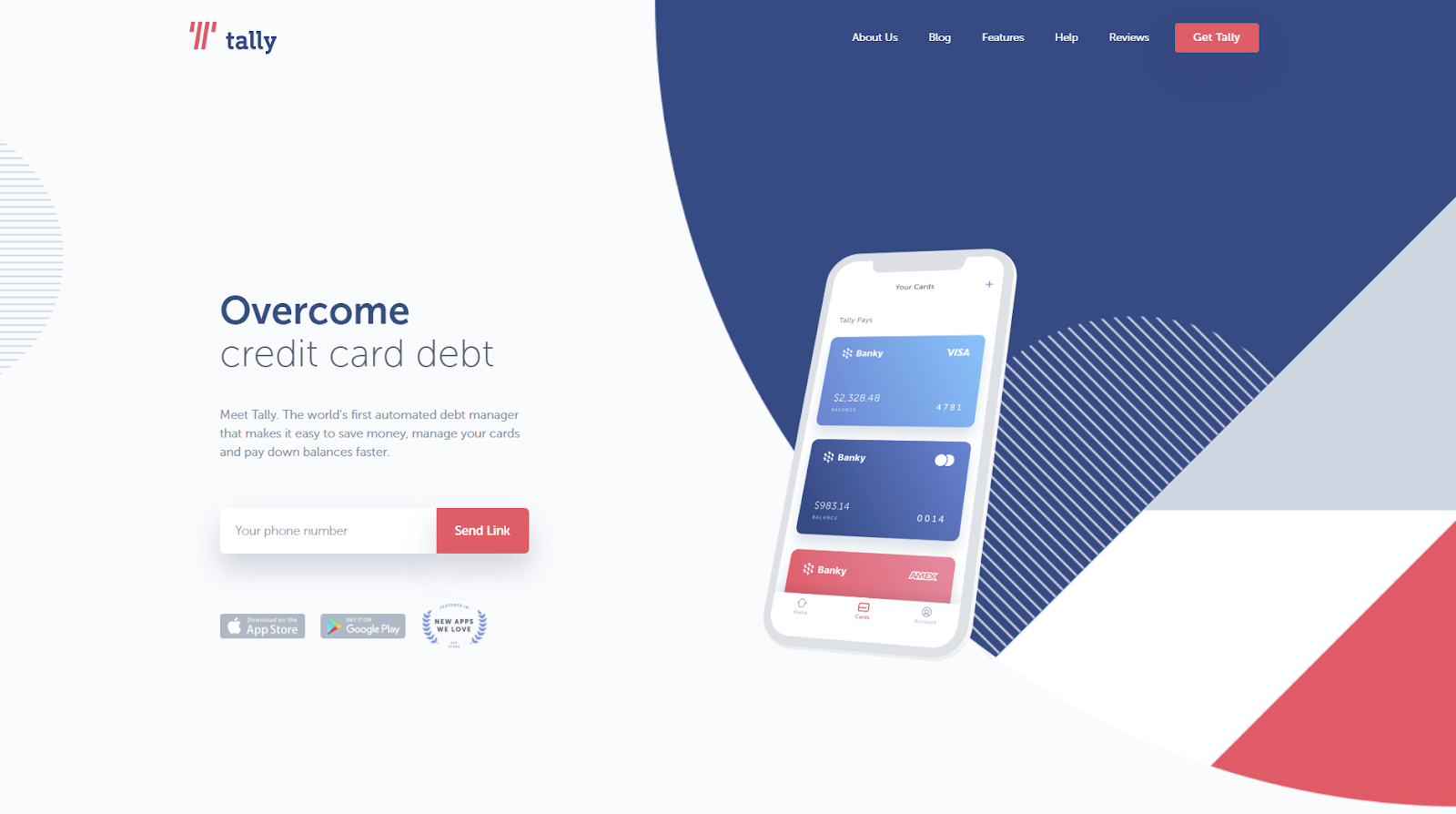Startup of the day (September-October 2018)

Continuing the “Startup of the Day” series of digests, today I present the most interesting projects for September-October 2018. If you want to get acquainted with the others, then please in my blog. Records are available on Facebook , VK , ICQ and Telegram .
Moneylion

Banks and financial services are a huge part of the economy. Americans owe banks $ 4 trillion, I quickly did not find the annual payment, but in any case it is measured in hundreds of billions, a super tasty tidbit. And startups flock to him like flies on honey.
Over the past 7 years, no one has come up with anything radically new. All run banks without branches with a mobile application, bright design, instant transfers, convenient investments and quick approval of the loan. Someone managed to unwind before the old players filed a beautiful app - they got market share, someone was late, and to hell with them, with such startups.
The American startup Moneylion started relatively late, in 2013, but managed to jump on the train triathlon and gained 2 million active users - many even by American standards.
For the review, I chose it for the sake of two product ideas, both of which hardly influenced the company's business significantly, but both are beautiful in their own way, and I hadn’t written about such before. First, Moneylion pays for the daily launch of the application. The model is often found in games and robotized services like LingauLeo, but there users get internal candy wrappers, and here the client earns almost a dollar of real money every day - they are then changed to gift cards of stores. For a startup, cards cost, say, half the nominal. But it still means that in order to pay for the program Moneylion for one launch of the application imposes unnecessary services at 50 cents margin. In order of magnitude, this is the Yandex.Taxi commission for one trip, but there the passenger wanted to go and launched the applet specifically for this, and then they shoved him something, while he just logged in for freebies. Good to be a bank!
The second interesting idea is to subscribe to a cheap loan. The client pays $ 29 a month, but if necessary, borrows at a reduced rate. Moneylion benefits in both cases: if the user cannot count, then he will deceive himself, and if he can, this is a positive scoring factor, the percentage can be reduced fairly. However, probably, more often they do not know how to count. Together, both features give a very curious effect - if you log in every day, then the privileges of a paid subscription are free, and the startup also uses it in PR. Users who are unsavory on advertisements during the daily launches of the application add especially many unnecessary services.
Moneylion's investment has raised $ 95 million.
Tally

Banks play an interesting game with consumers: they put credit cards on cashbacks, bonuses and free miles, spend money on it and wait for the client to stumble once and skip the payment until the end of the grace period. It also includes horse interest, which pays for the cost of the loan itself and unrestrained promotions, which were used by the debtor and a couple of more cautious clients.
American startup Tally joins the battle on the human side. The user installs the mobile application, connects the cards, and then the startup automatically covers the debts to the banks with a loan in Tally. The percentage, of course, turns out to be significantly lower - the costs of cashbacks and miles are not included in it, the silly old bank still pays for bonuses. Victory, everyone except the bankers is happy, I don’t have anything to write about and everything is clear.
The project is still small, investment has spent $ 24 million and another 18 attracted in the recent round. There is still room to grow, but a very large company will never become: the less customers fall into the banks' traps, the less sense there is in bonus tricks, the closer their percentage is to the percentage of Tally.
Homelike

Remembering Airbnb is trite, but it really changed the whole industry. Tourists now find accommodation quickly and comfortably, and pay little for it. Unfortunately, for a business trip for a couple of months, the service is much worse - discounts for wholesale are small, reviews are irrelevant for long stays. The choice is also narrowed down to apartments that no one has booked for a couple of days in the middle of the period - most likely, these are the worst apartments.
The European startup Homelike believes that the world is already globalized enough, people live in other cities for a long time, they need a special Airbnb to travel for months, not days. Cian and analogs do not close the need - they all focus on local residents and previews. The call “I come in a month, leave me an apartment” the owner only laughs, and this is crazy from the guest’s side - there are no reviews, the photos can be fake.
Homelike made exactly the Airbnb clone, even the design did not hesitate to lick, only the word “day” was replaced by “month” everywhere. Owners of apartment houses rent apartments - they are easier to connect to the platform than the corresponding number of private owners, and they will have feedback faster, there are many apartments, at least someone will write. Now a startup boasts forty-five thousand apartments, but these are apartments, and not different accommodation options, if there are one hundred of them in a house, then one hundred will go into the calculation.
In August, Homelike attracted the first large round of investment: $ 14 million, will scale tenant demand.
Gremlin

Once upon a time, when developing foto.mail.ru, a colleague used a macro instead of the usual disk access. On the combat environment, everything went as usual, and the developer threw a coin at the code, in 99% of cases returned data, in 1% - an error. As a result, the service inevitably worked correctly with real iron malfunctions, it was ready for them and tested many times.
Startup Gremlin comes from a similar philosophy. He offers the designer of environment failures to see how the service works when something goes wrong under control and in the test environment. In the simplest case, Gremlin operates at the server level: it loads the processor and disk, takes up a large amount of memory, and spoils the quality of the network connection. In a more interesting way, it parses the traffic and simulates problems with the used API: “and let this external service slow down”.
Technically, Gremlin is a demon that is placed on the customer's server, and an admin with catastrophe settings that hangs in the cloud. The combination is suitable for the convenience of billing (the same is common SaaS), and for interacting with the code. The fee is the need to access a large Internet from the tested machine, a certain limitation of the number of customers. However, nothing prevents for corporations from Fortune-500 and management to put inside their contour.
Gremlin appeared only two years ago, spent so far $ 9 million of investments, recently attracted another 18.
Wunder mobility

Taxis, car sharing and similar services compete at the city level, and not the country or even more so in the world. The conditional Gett attracts both passengers and drivers separately in each locality, the share of roaming - Muscovites who order a car in St. Petersburg - is very small. Global Uber passed to local players and China, and Russia, and Southeast Asia, dominance in the United States did not help him.
On the other hand, the local aggregator in the conditional Irkutsk inevitably loses Yandex.Taxi, and it’s not only venture money, you can find several million dollars in the region’s capital, it would give parity. The problem in technology: the scale of Russia is enough to spend on the development of five percent of total costs and have an acceptable product, and a separate city is too small.
Startup Wunder Mobility sees an opportunity here. It is on a taxi that a startup has not yet swung, it comes from adjacent markets. He wrote a universal software for car sharing, ride-sharing (BlaBlaCar inside the city) and taxi-pooling (as Via). Now any city service buys a license, does not spend money on programmers and fights on equal terms with anyone.
Open price looks very sparingly. Integration and implementation are individual and are considered separately, but then full transparency. Carsharing, for example, costs 17 euros per month per car. On the scale of our Belka or YouDrive - up to 50,000 euros per month, it is quite affordable; the programming team is probably more expensive for them. Or, on the other hand, if you shift the price to the end user head-on, the tariff will increase by 25 kopecks per minute, which is not critical.
While only very small partners are connected to Wunder Mobility, a startup boasts users on four continents, but only a million trips per month. Citymobil, for comparison, is now making two and a half million in one Moscow. But investors believe in a great future; a month ago, the company attracted the first big round: $ 30 million.
